| Listing 1 - 9 of 9 |
Sort by
|
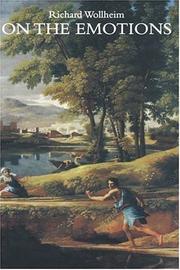
ISBN: 0585366799 9780585366791 0300079745 Year: 1999 Volume: 1991 Publisher: New Haven, CT : Yale University Press,
Abstract | Keywords | Export | Availability | Bookmark
 Loading...
Loading...Choose an application
- Reference Manager
- EndNote
- RefWorks (Direct export to RefWorks)
"Richard Wollheim recruits into service the insights of literature and of psychoanalysis, as well as of philosophy, in this thought-provoking account of the emotions. Starting from the premise that emotions form a distinct psychological category, Wollheim argues that they are - like beliefs and desiresdispositions or underlying forces in the mind that erupt from time to time into the stream of consciousness. However, to assimilate emotions to beliefs or to desires or to some combination of the two is quite wrong. Emotions are attitudes or orientations to the world, says the author, and in this regard they are naturally associated with the imagination."--Jacket.
Emotions. --- Emotions --- Social Sciences --- Psychology --- Feelings --- Human emotions --- Passions --- Affect (Psychology) --- Affective neuroscience --- Apathy --- Pathognomy

ISBN: 0300079745 9780300079746 Year: 1999 Volume: 1991 Publisher: New Haven: Yale university press,
Abstract | Keywords | Export | Availability | Bookmark
 Loading...
Loading...Choose an application
- Reference Manager
- EndNote
- RefWorks (Direct export to RefWorks)
"Richard Wollheim recruits into service the insights of literature and of psychoanalysis, as well as of philosophy, in this thought-provoking account of the emotions. Starting from the premise that emotions form a distinct psychological category, Wollheim argues that they are - like beliefs and desiresdispositions or underlying forces in the mind that erupt from time to time into the stream of consciousness. However, to assimilate emotions to beliefs or to desires or to some combination of the two is quite wrong. Emotions are attitudes or orientations to the world, says the author, and in this regard they are naturally associated with the imagination."--Jacket.
Philosophical anthropology --- wijsgerige antropologie --- Affective and dynamic functions --- Emotions --- Feelings --- Human emotions --- Passions --- Emotions. --- Hulpwetenschappen --- Filosofie. --- Emoties --- Gevoelens --- Passies --- Sentiments --- Émotions --- Émotivité --- Psychology --- Affect (Psychology) --- Affective neuroscience --- Apathy --- Pathognomy --- Émotions (philosophie)

ISBN: 0138491593 Year: 1999 Publisher: Upper Saddle River, N.J. Prentice Hall
Abstract | Keywords | Export | Availability | Bookmark
 Loading...
Loading...Choose an application
- Reference Manager
- EndNote
- RefWorks (Direct export to RefWorks)
Emotions. --- Motivation (Psychology). --- Psychology, Comparative. --- Emotions --- Motivation (Psychology) --- Psychology, Comparative --- Behavior, Comparative --- Comparative behavior --- Comparative psychology --- Ethology, Comparative --- Intelligence of animals --- Zoology --- Animal behavior --- Animal intelligence --- Animal psychology --- Human behavior --- Instinct --- Feelings --- Human emotions --- Passions --- Psychology --- Affect (Psychology) --- Affective neuroscience --- Apathy --- Pathognomy --- Action, Psychology of --- Drive (Psychology) --- Psychology of action

ISBN: 1280331879 9786610331871 0203024486 0203159470 9780203159477 0415146186 9780415146180 9780203024485 9781280331879 6610331871 9781134757817 9781134757855 9781134757862 9781138874336 0719062594 1134757859 Year: 1999 Publisher: London ; New York : Routledge,
Abstract | Keywords | Export | Availability | Bookmark
 Loading...
Loading...Choose an application
- Reference Manager
- EndNote
- RefWorks (Direct export to RefWorks)
To feminists and some postmodernists reason/emotion and man/woman represent two fundamental polarities, fixed deep within Western philosophy and reflected in the structures of our languages, and two sets of hierarchical power relations in patriarchal society. Raia Prokhovnik challenges the tradition of dualism and argues that rational woman need no longer be a contradiction in terms. Prokhovnik examines in turn: · the nature of dichotomy, its problems and an alternative · the reason/emotion dichotomy · dichotomies central to the man/woman dualism, such as sex/gender and the heterosexual/ist n
Dualism. --- Reason. --- Emotions. --- Feminist theory. --- Feminism --- Feminist philosophy --- Feminist sociology --- Theory of feminism --- Feelings --- Human emotions --- Passions --- Psychology --- Affect (Psychology) --- Affective neuroscience --- Apathy --- Pathognomy --- Mind --- Intellect --- Rationalism --- Philosophy --- Idealism --- Materialism --- Monism --- Occasionalism --- Realism --- Dualism --- Emotions (Philosophy) --- Feminist theory --- Reason --- #KVHA:Feminisme --- #KVHA:Politiek
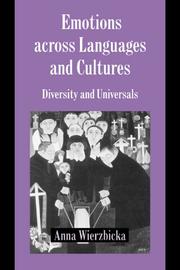
ISBN: 0521599717 0521590426 0511521251 Year: 1999 Volume: *3 Publisher: Cambridge New York Melbourne Paris Cambridge University Press Maison des Sciences de l'Homme
Abstract | Keywords | Export | Availability | Bookmark
 Loading...
Loading...Choose an application
- Reference Manager
- EndNote
- RefWorks (Direct export to RefWorks)
In this fascinating book, Anna Wierzbicka brings psychological, anthropological and linguistic insights to bear on our understanding of the way emotions are expressed and experienced in different cultures, languages, and culturally-shaped social relations. The expression of emotion in the face, body and modes of speech are all explored and Wierzbicka shows how the bodily expression of emotion varies across cultures and challenges traditional approaches to the study of facial expressions. As well as offering a perspective on human emotions based on the analysis of language and ways of talking about emotion, this intriguing and controversial book attempts to identify universals of human emotion by analysing empirical evidence from different languages and cultures. This book will be invaluable to academics and students of emotion across the social sciences.
Emotions --- Body language --- Communication and culture --- Langage du corps --- Communication et culture --- #SBIB:309H505 --- #SBIB:309H517 --- #SBIB:001.GIFTCOM --- Code en boodschap: psychologische, psycho-analytische benadering --- Verbale communicatie: sociale psychologie van de taal en de interactie, psycholinguistiek --- Emoties --- Lichaamstaal --- Non-verbale communicatie --- Taal en cultuur --- Uitdrukking van emoties en cultuur --- Cross-cultural studies. --- interculturele studies --- Lichaamstaal. --- Non-verbale communicatie. --- Taal en cultuur. --- Uitdrukking van emoties en cultuur. --- interculturele studies. --- Cross-cultural studies --- Feelings --- Human emotions --- Passions --- Psychology --- Affect (Psychology) --- Affective neuroscience --- Apathy --- Pathognomy --- Health Sciences --- Psychiatry & Psychology
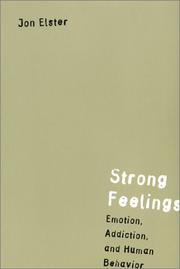
ISBN: 0262550369 0262050560 0262272318 0585077738 0262262541 9780262272315 9780262262545 9780262550369 Year: 1999 Volume: 1997 Publisher: Cambridge (Mass.) : MIT press,
Abstract | Keywords | Export | Availability | Bookmark
 Loading...
Loading...Choose an application
- Reference Manager
- EndNote
- RefWorks (Direct export to RefWorks)
Emotion and addiction lie on a continuum between simple visceral drives such as hunger, thirst, and sexual desire at one end and calm, rational decision making at the other. Although emotion and addiction involve visceral motivation, they are also closely linked to cognition and culture. They thus provide the ideal vehicle for Jon Elster's study of the interrelation between three explanatory approaches to behavior: neurobiology, culture, and choice.The book is organized around parallel analyses of emotion and addiction in order to bring out similarities as well as differences. Elster's study sheds fresh light on the generation of human behavior, ultimately revealing how cognition, choice, and rationality are undermined by the physical processes that underlie strong emotions and cravings. This book will be of particular interest to those studying the variety of human motivations who are dissatisfied with the prevailing reductionisms.
Emotions --- Addicts --- Compulsive behavior --- Substance abuse --- Choice (Psychology) --- Psychology --- Etiology --- -Choice (Psychology) --- -Emotions --- Addicted persons --- Addictive persons --- #SBIB:309H505 --- 316.6 --- Feelings --- Human emotions --- Passions --- Affect (Psychology) --- Affective neuroscience --- Apathy --- Pathognomy --- 316.6 Gedragstheorie. Sociaal gedrag. Sociale psychologie --(gedrag en zelfconcept van het individu in de groep z.o. {159.923.33}) --- Gedragstheorie. Sociaal gedrag. Sociale psychologie --(gedrag en zelfconcept van het individu in de groep z.o. {159.923.33}) --- Addictive behavior --- Behavior, Compulsive --- Compulsion (Psychology) --- Impulse --- Psychology, Pathological --- Obsessive-compulsive disorder --- Sick --- Code en boodschap: psychologische, psycho-analytische benadering --- Choice (Psychology). --- Emotions. --- Psychology. --- Etiology. --- COGNITIVE SCIENCES/General --- COGNITIVE SCIENCES/Psychology/Cognitive Psychology --- Addicts - Psychology --- Compulsive behavior - Etiology --- Substance abuse - Etiology
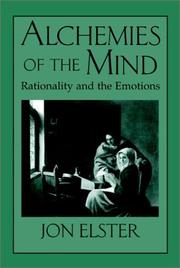
ISBN: 0521644879 0521642795 1139173308 9780521642798 9781139173308 9780521644877 Year: 1999 Publisher: Cambridge Cambridge University Press
Abstract | Keywords | Export | Availability | Bookmark
 Loading...
Loading...Choose an application
- Reference Manager
- EndNote
- RefWorks (Direct export to RefWorks)
Jon Elster has written a comprehensive, wide-ranging book on the emotions in which he considers the full range of theoretical approaches. Drawing on history, literature, philosophy and psychology Elster presents a complete account of the role of the emotions in human behavior. Combining methodological and theoretical arguments with empirical case studies and written with Elster's customary verve and economy, this book will have a broad appeal to those in philosophy, psychology, economics, political science, as well as literary studies, history, and sociology.
316.6 --- #SBIB:309H505 --- 316.6 Gedragstheorie. Sociaal gedrag. Sociale psychologie --(gedrag en zelfconcept van het individu in de groep z.o. {159.923.33}) --- Gedragstheorie. Sociaal gedrag. Sociale psychologie --(gedrag en zelfconcept van het individu in de groep z.o. {159.923.33}) --- Code en boodschap: psychologische, psycho-analytische benadering --- Emotions --- Emotions in literature --- Feelings --- Human emotions --- Passions --- Psychology --- Affect (Psychology) --- Affective neuroscience --- Apathy --- Pathognomy --- Social aspects --- Philosophical anthropology --- Affective and dynamic functions --- Emotions. --- Emotions in literature. --- Social aspects. --- Arts and Humanities --- Philosophy --- Emotions - Social aspects. --- Emotions (Philosophy) --- Reason
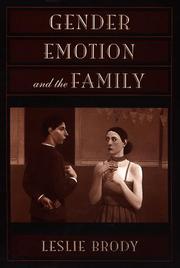
ISBN: 9780674028821 0674028821 9780674028821 9780674341869 0674341864 Year: 1999 Publisher: Cambridge (Mass.) : Harvard University Press,
Abstract | Keywords | Export | Availability | Bookmark
 Loading...
Loading...Choose an application
- Reference Manager
- EndNote
- RefWorks (Direct export to RefWorks)
Popular stereotypes hold that women express their feelings more than men, but Leslie Brody argues that nurture, not nature, is the stronger force. Culture, ethnicity, status and particularly the organisation of the family all affect emotional expression.
Emotions --- Families --- Sex differences (Psychology) --- Stereotypes (Social psychology) --- Interpersonal communication --- Family. --- Émotions --- Famille --- Différences entre sexes (Psychologie) --- Stéréotypes. --- Communication interpersonnelle --- Psychology --- FAMILY & RELATIONSHIPS --- Sex differences (Psychology). --- Stereotypes (Social psychology). --- Sekseverschillen. --- Interpersoonlijke communicatie. --- Emoties. --- Gezin. --- Sex differences. --- Différences entre sexes. --- Différences entres sexes. --- Emotions. --- Death, Grief, Bereavement. --- Différences entre sexes (Psychologie). --- Family --- Psychiatry - General --- Psychiatry --- Health & Biological Sciences --- Sex differences --- Différences entre sexes (psychologie). --- Family & relationships --- Sex differences (psychology). --- Stereotypes (social psychology). --- Death, grief, bereavement. --- Mental stereotypes --- Stereotype (Psychology) --- Stereotyping (Social psychology) --- Family life --- Family relationships --- Family structure --- Relationships, Family --- Structure, Family --- Feelings --- Human emotions --- Passions --- Social aspects --- Social conditions --- Communication --- Interpersonal relations --- Social psychology --- Attitude (Psychology) --- Rigidity (Psychology) --- Sex (Psychology) --- Social institutions --- Birth order --- Domestic relations --- Home --- Households --- Kinship --- Marriage --- Matriarchy --- Parenthood --- Patriarchy --- Affect (Psychology) --- Affective neuroscience --- Apathy --- Pathognomy --- Families.

ISBN: 1846429021 0585122628 9780585122625 1853024511 185302452X 9781846429026 Year: 1999 Volume: 7 Publisher: London ; Philadelphia : Jessica Kingsley Publishers,
Abstract | Keywords | Export | Availability | Bookmark
 Loading...
Loading...Choose an application
- Reference Manager
- EndNote
- RefWorks (Direct export to RefWorks)
Criminal psychology. --- Remorse. --- Reparation (Criminal justice) --- Criminal Psychology. --- Emotions. --- Morals. --- Criminal psychology --- Remorse --- Behavior and Behavior Mechanisms --- Ethics --- Psychology, Applied --- Psychology, Social --- Philosophy --- Psychiatry and Psychology --- Humanities --- Psychological Phenomena and Processes --- Emotions --- Morals --- Criminal Psychology --- Social Welfare & Social Work --- Social Sciences --- Criminology, Penology & Juvenile Delinquency --- Psychology, Criminal --- Criminal Behavior --- Morality --- Retrospective Moral Judgment --- Regret --- Feelings --- Emotion --- Feeling --- Regrets --- Psychologic Processes --- Psychologic Processes and Principles --- Psychological Processes --- Phenomena, Psychological --- Processes, Psychologic --- Processes, Psychological --- Psychological Phenomenas --- Psychological Processe --- Pharmacy Philosophy --- Philosophical Overview --- Hedonism --- Stoicism --- Overview, Philosophical --- Overviews, Philosophical --- Pharmacy Philosophies --- Philosophical Overviews --- Philosophies --- Philosophies, Pharmacy --- Philosophy, Pharmacy --- Psychology, Perceptual --- Social Psychology --- Perceptual Psychology --- Applied Psychology --- Applied Psychologies --- Psychologies, Applied --- Egoism --- Ethical Issues --- Metaethics --- Moral Policy --- Natural Law --- Situational Ethics --- Ethical Issue --- Ethics, Situational --- Issue, Ethical --- Issues, Ethical --- Law, Natural --- Laws, Natural --- Moral Policies --- Natural Laws --- Policies, Moral --- Policy, Moral --- Censorship, Research --- Behavior And Behavior Mechanism --- Remorsefulness --- Reproach of self --- Self-reproach --- Criminal psychiatry --- Criminals --- Criminal anthropology --- Psychology --- Psychology, Pathological --- Compensation for victims of crime --- Criminal restitution --- Reparation --- Restitution (Criminal justice) --- Restitution for victims of crime --- Remedies (Law) --- Reparation (Criminal justice). --- Réparations des crimes de l'histoire --- Reparation. --- Psychological Phenomena --- Factors, Psychological --- Psychological Factors --- Psychological Side Effects --- Psychologists --- Psychosocial Factors --- Side Effects, Psychological --- Factor, Psychological --- Factor, Psychosocial --- Factors, Psychosocial --- Psychological Factor --- Psychological Side Effect --- Psychologist --- Psychosocial Factor --- Side Effect, Psychological --- Behavior and Behavior Mechanisms. --- Ethics. --- Psychology, Applied. --- Psychology, Social. --- Philosophy. --- Psychology. --- Humanities. --- Psychological Phenomena.
| Listing 1 - 9 of 9 |
Sort by
|

 Search
Search Feedback
Feedback About UniCat
About UniCat  Help
Help News
News